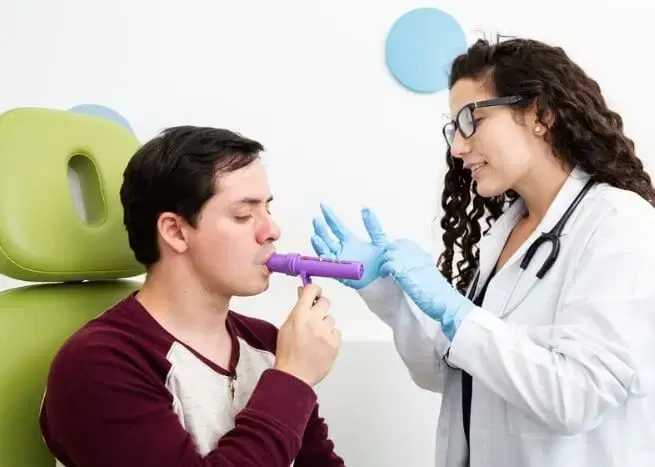
Hydrogen Breath Test: Diagnosing Lactose Intolerance and Small Intestinal Bacterial Overgrowth (SIBO)
In today’s fast-paced world, digestive issues are becoming increasingly common, with many people suffering from discomfort without a clear diagnosis. Fortunately, medical science has advanced, offering non-invasive tests to identify the root cause of these problems. One such diagnostic tool is the hydrogen breath test, a simple yet effective method used to detect conditions like lactose intolerance and small intestinal bacterial overgrowth (SIBO). Let’s dive into how this test works and why it’s essential, especially in the Indian context.
What Is the Hydrogen Breath Test?
The hydrogen breath test measures the amount of hydrogen gas in the breath after consuming specific sugars. Why hydrogen, you ask? Well, our bodies typically don’t produce much hydrogen gas. However, when undigested carbohydrates, like lactose, reach the colon, they undergo fermentation by gut bacteria, which leads to hydrogen production. This hydrogen then travels through the bloodstream to the lungs, where it can be detected in the breath.
This test helps diagnose two main conditions:
- Lactose intolerance, where the body cannot properly digest lactose (the sugar found in dairy).
- SIBO, where bacteria that usually reside in the colon migrate to the small intestine, causing fermentation of sugars and gas production.
How Does the Hydrogen Breath Test Work?
The hydrogen breath test procedure is relatively simple but requires a bit of patience. Here’s a step-by-step breakdown:
- Fasting: Before the test, patients must fast for several hours (typically 8–12) to ensure an accurate reading.
- Sugar Solution: Depending on what the doctor is testing for, the patient will consume a sugar solution. For lactose intolerance, it’s lactose, and for SIBO, it’s usually glucose or lactulose.
- Breath Collection: Breath samples are collected at regular intervals, every 15–30 minutes, over a period of 2–3 hours. The aim is to measure how much hydrogen is being produced in response to the sugar intake.
- Results: Elevated hydrogen levels after sugar consumption indicate that something is not being absorbed properly, either due to lactose malabsorption or bacterial overgrowth in the small intestine.
Sounds straightforward, right? But the insights it provides can be life-changing, especially for people who’ve been dealing with unexplained digestive discomfort for years.
Conditions Diagnosed by the Hydrogen Breath Test
Lactose Intolerance
If you’ve ever felt bloated or rushed to the bathroom after a glass of milk, you’re not alone. Lactose intolerance is incredibly common, particularly in India. In fact, studies suggest that up to 70% of Indians may have some degree of lactose intolerance. This condition occurs when the body lacks the enzyme lactase, which is needed to break down lactose. As a result, undigested lactose ferments in the colon, producing hydrogen and causing symptoms like:
- Bloating
- Gas
- Diarrhoea
The hydrogen breath test serves as a simple and non-invasive way to confirm whether lactose intolerance is behind these symptoms.
Small Intestinal Bacterial Overgrowth (SIBO)
While lactose intolerance gets a lot of attention, SIBO is a condition that’s becoming more recognized. SIBO occurs when bacteria from the colon migrate to the small intestine, where they don’t belong. These bacteria ferment sugars, leading to excessive gas production and symptoms like:
- Bloating
- Abdominal pain
- Diarrhoea
Diagnosing SIBO can be tricky because its symptoms overlap with many other digestive disorders. However, the hydrogen breath test for SIBO is a reliable method to detect the overgrowth of these bacteria.
Read more: Unravelling Bloating: Causes, Symptoms, and Effective Management
What to Expect During the Test
If you’re scheduled for a hydrogen breath test, don’t worry—it’s quite straightforward. First, you’ll need to fast before the test, as mentioned earlier. Once you arrive at the clinic, you’ll be given a sugar solution to drink. Over the next few hours, you’ll be asked to blow into a breath analyzer at regular intervals.
Some people may experience mild bloating or discomfort during the test, but the procedure is non-invasive and painless. In a nutshell, it’s an easy way to get a deep look into your digestive health.
Interpreting Hydrogen Breath Test Results
So, how do doctors interpret the results of a hydrogen breath test? A rise in hydrogen levels by 20 parts per million or more above the baseline is considered a positive result for lactose malabsorption or SIBO. It’s important to note that while the test provides valuable data, your healthcare provider will also consider your symptoms and medical history to make a definitive diagnosis.
This combination of test results and clinical evaluation ensures a more accurate diagnosis, allowing for a tailored treatment plan.
Prevalence in India: Lactose Intolerance and SIBO
As mentioned earlier, lactose intolerance is widespread in India due to genetic factors. With such a high percentage of the population affected, it’s no wonder that the hydrogen breath test has become a go-to diagnostic tool for this condition.
Similarly, SIBO is gaining attention, particularly among those with irritable bowel syndrome (IBS). In India, where dietary habits and gut health are closely linked, it’s important to recognize the prevalence of these conditions to ensure timely diagnosis and management.
Hydrogen Breath Test at Gastroenterology Centre
Specialized gastroenterology centre across India, including Bangalore Gastro Centre, offer the hydrogen breath test under the care of trained professionals. Consulting a gastroenterologist is essential for determining whether this test is right for you. It’s always best to seek expert advice when dealing with persistent digestive issues.
Conclusion
The hydrogen breath test is a valuable tool in diagnosing conditions like lactose intolerance and SIBO, both of which are common in India. If you’re experiencing digestive discomfort, this non-invasive test might just hold the key to unlocking relief. Always consult with your healthcare provider to discuss your symptoms and whether this test is appropriate for you.
For more information on digestive health and diagnostic testing, feel free to explore resources available at Bangalore Gastro Centre.
